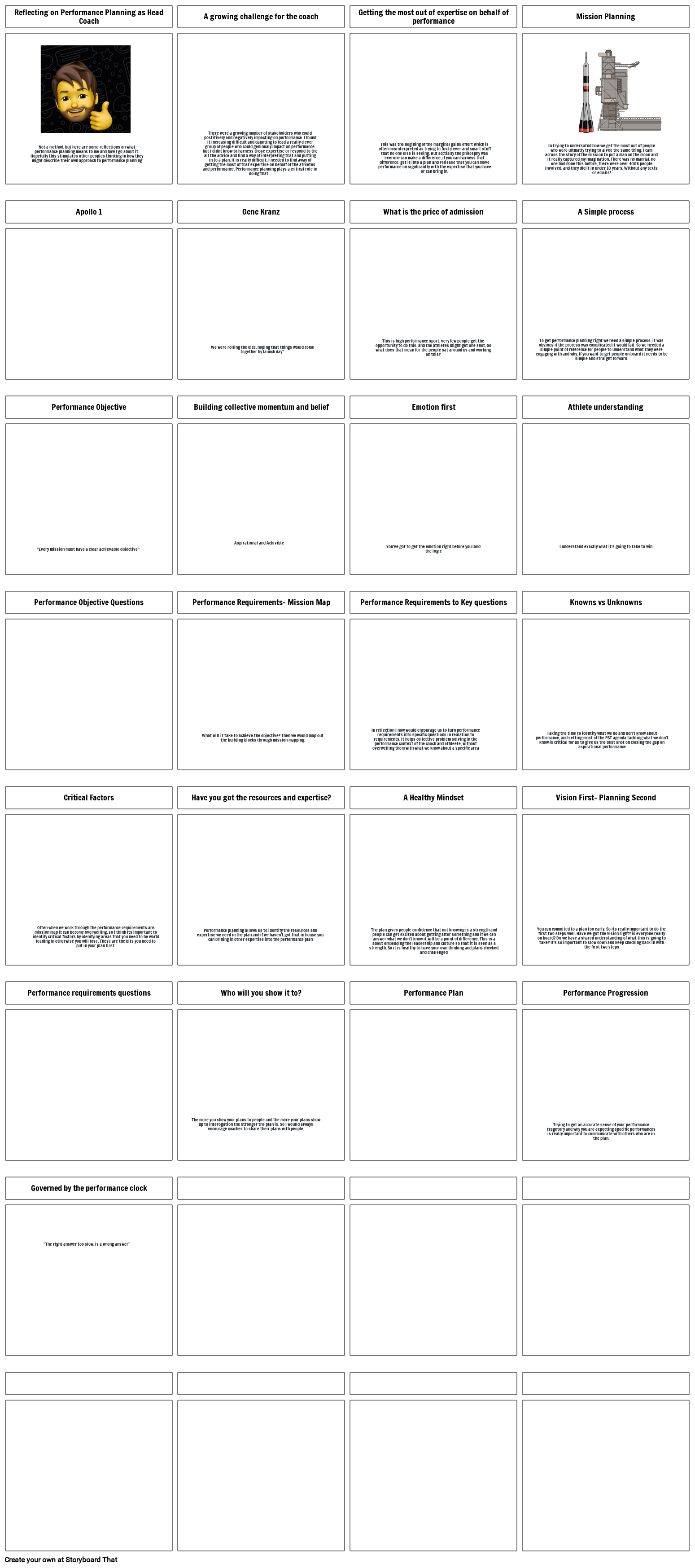Matt Parker Performance Planning

Storyboard Text
- Reflecting on Performance Planning as Head Coach
- Not a method, but here are some reflections on what performance planning means to me and how I go about it. Hopefully this stimulates other peoples thinking in how they might describe their own approach to performance planning
- A growing challenge for the coach
- There were a growing number of stakeholders who could postitively and negatively impacting on performance. I found it increasing difficult and daunting to lead a really clever group of people who could geninualy impact on performance, but i didnt know to harness those expertise or respond to the all the advice and find a way of interpreting that and putting in to a plan. It is really difficult. I needed to find away of getting the most of that expertise on behalf of the athletes and performance. Performance planning plays a critical role in doing that...
- Getting the most out of expertise on behalf of performance
- This was the begining of the marginal gains effort which is often misinterpreted as trying to find clever and smart stuff that no one else is seeing. But acctially the philosphy was everone can make a difference, if you can harness that difference, get it into a plan and relisase that you can move performance on signficantly with the expertise that you have or can bring in.
- Mission Planning
- In trying to undersatnd how we get the most out of people who were ultmatly trying to aivee the same thing, I cam across the story of the mission to put a man on the moon and it really captured my imagination. There was no mannal, no one had done this before, there were over 400k people involved, and they did it in under 10 years. Without any texts or emails!
- Apollo 1
- Gene Kranz
- What is the price of admission
- A Simple process
- Performance Objective
- Building collective momentum and belief
- We were rolling the dice, hoping that things would come together by launch day”
- Emotion first
- This is high performance sport, very few people get the opportunity to do this, and the athletes might get one shot. So what does that mean for the people sat around us and working on this?
- Athlete understanding
- To get performance planning right we need a simple process, it was obvious if the process was complicated it would fail. So we needed a simple point of reference for people to understand what they were engaging with and why.If you want to get people on board it needs to be simple and straight forward.
- Performance Objective Questions
- “Every mission must have a clear achievable objective”
- Performance Requirements- Mission Map
- Aspirational and Achivible
- Performance Requirements to Key questions
- You've got to get the emotion right before you land the logic
- Knowns vs Unknowns
- I understand exactly what it's going to take to win
- What will it take to achieve the objective? Then we would map out the building blocks through mission mapping.
- In reflection I now would encourage us to turn performance requirements into specific questions in realation to requirements. It helps collective problem solving in the performance context of the coach and athleete, without overwelling them with what we know about a specific area
- Taking the time to identify what we do and don't know about performance, and setting most of the PST agenda tackling what we don't know is critical for us to give us the best shot on closing the gap on aspirational performance
- Critical Factors
- Often when we work through the performance requirements ans mission map it can become overwelling. so i think its important to identify critical factors by idenifying areas that you need to be world leading in otherwise you will lose. These are the bits you need to put in your plan first.
- Have you got the resources and expertise?
- Performance planning allows us to identify the resources and expertise we need in the plan and if we haven't got that in house you can brining in other expertise into the performance plan
- A Healthy Mindset
- The plan gives people confidence that not knowing is a strength and people can get excited about getting after something and if we can answer what we don't know it will be a point of difference. This is a about embedding the leadership and culture so that it is seen as a strength. So it is healthy to have your own thinking and plans checked and challenged
- Vision First- Planning Second
- You can commited to a plan too early. So its really important to do the first two steps well. Have we got the vision right? is everyone really on board? Do we have a shared understanding of what this is going to take? It's so important to slow down and keep checking back in with the first two steps
- Performance requirements questions
- Who will you show it to?
- Performance Plan
- Performance Progression
- Governed by the performance clock
- “The right answer too slow, is a wrong answer”
- The more you show your plans to people and the more your plans show up to interogation the stronger the plan is. So I woulldalways encourage coaches to share their plans with people.
- Trying to get an accurate sense of your performance tragetory and why you are expecting specific performances is really important to communicate with others who are in the plan.
Over 30 Million Storyboards Created
No Downloads, No Credit Card, and No Login Needed to Try!
